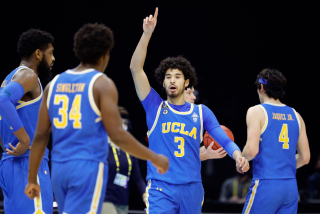The Brads give Aston Villa an American look
LONDON — Brad Friedel has seen plenty in his long career. This, though, is a new one.
For the first time since he moved to the English Premier League back in 1997, Friedel has an American teammate. Another goalkeeper, no less. And, as if that wasn’t enough, the new kid is named Brad, too.
“That’s kind of amazing, eh?” Friedel said as Brad Guzan laughed.
The Brads arrived at Aston Villa by very different means. Friedel is a veteran goalkeeper who, at 37, was looking for a new challenge after eight seasons at Blackburn. Guzan is an up-and-comer, eager to hone his skills against the best in the world after being named Major League Soccer’s goalkeeper of the year in 2007.
But their goal is the same -- elevating Villa to the Premier League’s elite. And their pairing could pay big dividends for the United States in the years to come.
“I would argue (Friedel) might be the best goalkeeper in the Premier League,” said former U.S. coach Bruce Arena, now the coach for the Galaxy. “(Guzan) is still a bit of a project. He needs to get a lot of games under his belt before he establishes himself and becomes the goalkeeper that Friedel is.
“But it’ll be a great experience for him working with Brad.”
Aston Villa was a surprising fourth in the Premier League going into Saturday’s game against Fulham, and Friedel is a big part of the club’s surge. After blanking Arsenal in Villa’s first victory over the Gunners in almost a decade, he handed Manchester United its first Premier League shutout since Nov. 24, 2007, in a 0-0 draw last weekend.
In 14 games, he’s had five shutouts and given up 16 goals. He ranks as the third-best Premier League goalkeeper, behind Liverpool’s Jose Reina and Chelsea’s Petr Cech.
He also matched David James’ record for consecutive Premier League appearances last weekend at 166, and was set to pass him against Fulham.
“Villa is a really, really good club,” Friedel said. “Everything’s been great with the transition.”
Everything, that is, except the initial decision to move to Villa from Blackburn.
Work permit issues forced Friedel to bounce around Europe (he played in Denmark and Turkey) and the United States before he finally joined Liverpool in December 1997. It wasn’t the best fit, though, and he struggled to get playing time.
He found a home after moving to Blackburn in 2000. He helped the Rovers get promoted to the Premier League, and established himself as a consistent and skillful goalkeeper.
He’s a superb shot blocker and adept at playing angles; fans dubbed him “The Human Wall” after he stopped two penalty kicks during the 2002 World Cup. He also excels at organizing defenses, and is often seen shouting instructions to his teammates from his line.
“I had a great love for Blackburn, I really did,” Friedel said. “I just felt, at my age, I wanted a little bit of a spark and I wanted a change. I wanted to retest myself.”
In July, he signed a three-year deal with Villa. A week later, Guzan obtained a work permit and joined Villa, as well.
“Guzan has got a really, really positive attitude, just delightful,” manager Martin O’Neill said. “And Friedel has been a good goalkeeper for seven, eight, nine years now.”
While England inexplicably goes entire generations without a standout goalkeeper -- some date this latest drought all the way back to 1990, when Peter Shilton retired -- the United States continues to crank them out.
Guzan’s transfer makes him the third U.S. goalkeeper in the Premier League -- Tim Howard starts at Everton -- with another, Marcus Hahnemann, playing in the League Championship.
“I just think it’s our culture in athletics, the kind of coordination we have,” Arena said. “Americans, from early ages, in any kind of athletics they play, it’s eye-hand coordination. Obviously, soccer is not. For an American to go into goal and catch a ball and jump and dive, it’s not a radical change in the things they experience in everyday sports.”
But it’s one thing to have natural ability and another to translate that into success on the soccer field.
“I don’t think any one of us, any of the American goalkeepers coming over here, have evolved as goalkeepers until we came over here. You learn more over here,” Friedel said. “The coaching in America is a ton better now than when I was growing up, don’t get me wrong. That’s evolving as well, but it takes time.
“So although you could be a good athlete, when you come over here, you’re just raw.”
Which is why Guzan is content to be Friedel’s backup in England, rather than a starter in MLS.
Just 24, Guzan is likely battling Hahnemann to be Howard’s backup for the 2010 World Cup in South Africa, should the United States qualify. But he would not even be 30 in 2014, just entering his prime.
“You want to push yourself to the limits and you want to put yourself up against the best players, the best teams, the best league. By moving over here, I think I’ve done that,” Guzan said.
“In the MLS, because of different factors, you might not have 25 or 30 guys that, ultimately you could put on the field in any given week. Here, that’s how it is. It’s two, three guys competing for one spot and that’s what makes it so good. Day in and day out, you have to make sure you’re fighting.”
Guzan has yet to make an appearance in a Premier League game, but he got the start earlier this month in Villa’s 1-0 victory over Slavia Prague in the UEFA Cup. He made a couple of nice saves, including one on a low shot by Jaroslav Cerny, prompting O’Neill to call him “a great goalkeeper in the making” afterward.
Guzan also started for the United States in last week’s World Cup qualifier, notching his fourth shutout this year. Three of those came in World Cup qualifying.
“All American goalkeepers are good shot blockers. It’s an issue of learning your positioning, your angles,” Arena said. “More importantly, it’s how you organize the players in front of you. When you watch a player with all the experience Brad has, (Guzan) can only learn from that.”
Though Friedel didn’t know much about Guzan until he got to England -- Friedel hasn’t played for the U.S. team since 2004 -- and the two are 13 years apart, they have quickly developed an easy rapport. When Friedel needles Guzan about his loud voice or hairline, Guzan simply smiles or dishes it right back.
While some veterans might feel threatened by a player whose sole aim is to take their job, Friedel is not. He helps his younger teammate however he can, on and the off the field, knowing that the better Guzan becomes, the better it is for American soccer.
“The situation I’m is kind of a unique situation, and it’s a good situation to be in,” Guzan said. “With the experience he brings to the table and the experience he’s had throughout his career and just knowing a fellow American is over there, it made me feel good.
“To be able to pick his brain and work with him day in and day out, it’s been absolutely fantastic.”







